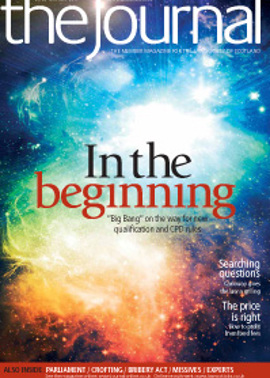Scottish Solicitors' Discipline Tribunal
Richard Allan Sandeman
A complaint was made by the Council of the Law Society of Scotland against Richard Allan Sandeman, solicitor, of Messrs Sandemans Solicitors, 256 Main Street, Camelon, Falkirk (“the respondent”). The Tribunal found the respondent guilty of professional misconduct in respect of his acting where there was a conflict of interest in that he acted for a client in a conveyancing transaction when he was acting for the client’s former cohabitee and co-proprietor, in circumstances where the former cohabitee and co-proprietor was seeking decree for an interdict against the client and was seeking to obtain and recover judicial expenses from the said client.
The Tribunal censured the respondent.
The Tribunal considered that a court action cannot be disposed of until a final interlocutor is granted, and the parties were in an active adversarial position. It was clear that the respondent felt uncomfortable with regard to acting in the conveyancing transaction, probably on the basis that he was aware of the potential conflict of interest. The Tribunal considered that a solicitor who takes on a case with two people who have clearly had a huge fallout should have ensured that everything was clarified so that there would be no difficulty with either party. The Tribunal accordingly considered that whether or not the respondent was aware of the Society’s guidance, he was clearly aware of the desirability of having a written minute of agreement in such circumstances. It has always been the case at common law, whether or not there is any guidance covering the position, that solicitors should not act in a conflict of interest situation and indeed this is set out in clear terms in the Code of Conduct 2002. If there had been a written minute of agreement, all the matters to be deducted from the free proceeds of sale would have been detailed in this agreement. Anything not included in the agreement could have not been deducted from the free proceeds of sale and the position accordingly would have been clear. The Tribunal accordingly found that the respondent acted where there was a conflict of interest and considered that this was contrary to the Code of Conduct for Scottish Solicitors 2002 and was conduct which could bring the profession into dispute.
The Tribunal noted that the previous findings against the respondent were not analogous and one was some considerable time ago. The Tribunal also took into account the fact that the respondent had already had to pay compensation and refund of fees in respect of the matter. The Tribunal also accepted that there was no ulterior motive behind the respondent acting in the way that he did and considered that in the whole circumstances it would be proportionate to merely censure the respondent.
The findings were appealed to the Court of Session, which refused the appeal.
Paul Saunders Jardine
A complaint was made by the Council of the Law Society of Scotland against Paul Saunders Jardine, solicitor, Jardine Phillips LLP, 205 Morningside Road, Edinburgh (“the respondent”). The Tribunal made no finding of professional misconduct.
The Tribunal must be satisfied that the respondent’s conduct was sufficient to amount to professional misconduct in terms of the Sharp test, Sharp v Council of the Law Society of Scotland 1984 SC 129. The Tribunal considered that there was a failure by the respondent in respect of his oversight in failing to record the deeds. The failure from December 2005 however was partly explained by Mrs O’s daughter’s failure to return the stamp duty form. The respondent also explained that the oversight in recording the deeds after June 2006 was due to him moving firms. This is not an excuse and the respondent’s conduct was regrettable, but the Tribunal had to consider whether it was sufficiently serious and reprehensible so as to amount to professional misconduct. It would appear that the respondent’s conduct did not have any impact on the inheritance tax situation and accordingly his client was not disadvantaged by what had happened. In the whole circumstances the Tribunal could not be satisfied beyond reasonable doubt that the Sharp test was met by this one oversight by the respondent.
In this issue
- Experience not to be missed
- Call in the experts
- Planning to deliver
- Stars of the future
- Registered Paralegal Scheme hits the mark
- CPD: a personal quest
- Wha's like us?
- Holyrood: a verdict
- Public ethos
- Power in name only?
- From the Brussels office
- Minority voices
- Law reform update
- Quinn Direct - when to intimate?
- Name your price
- Ask Ash
- Communication breakdown - a major risk issue
- Interested parties
- Support from afar
- Plus ça change?
- Where the state has to stop
- A NEST egg?
- Scottish Solicitors' Discipline Tribunal
- Website review
- Book reviews
- Above board
- Ruaig an Fhèidh
- The price of breach






